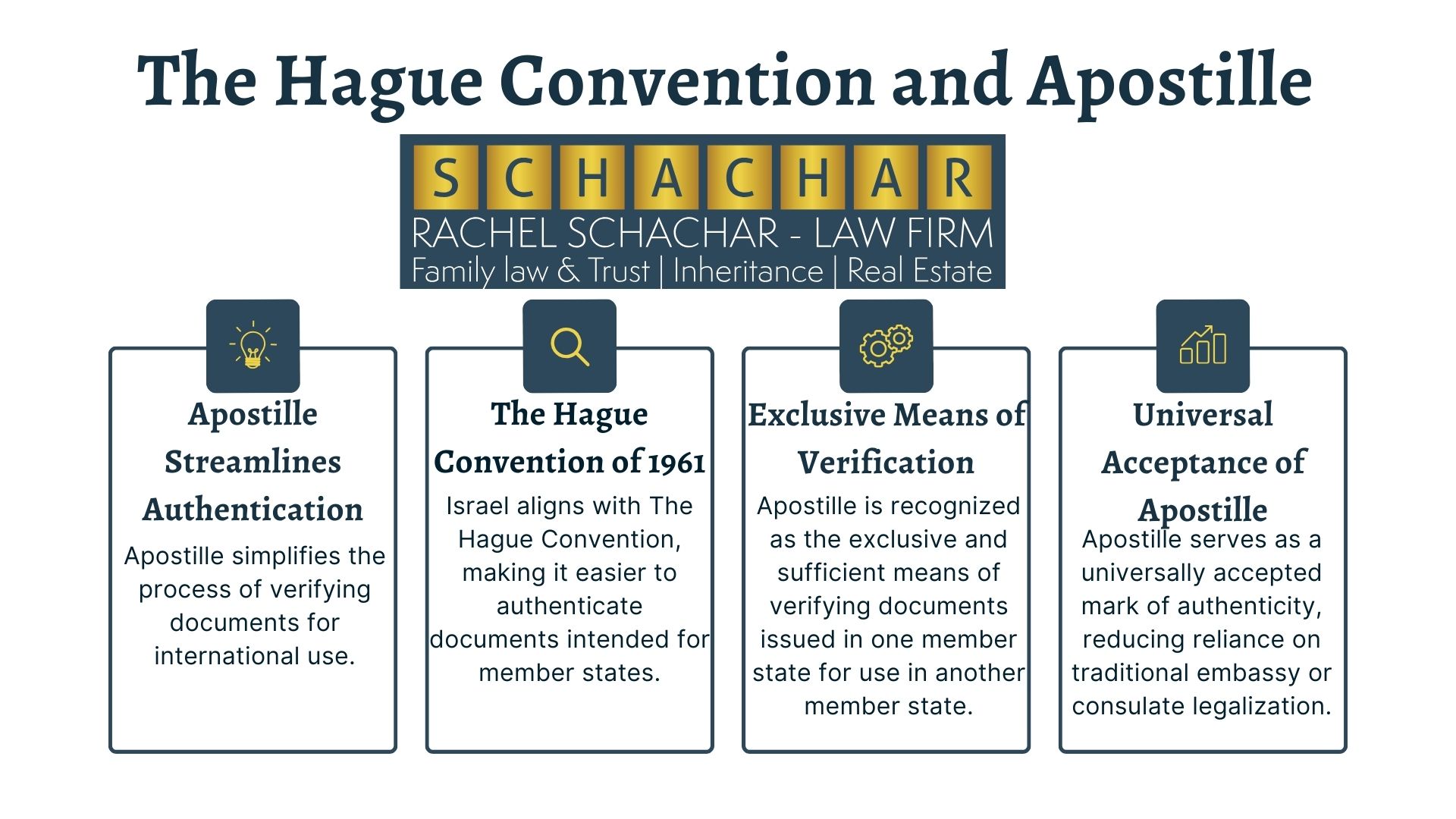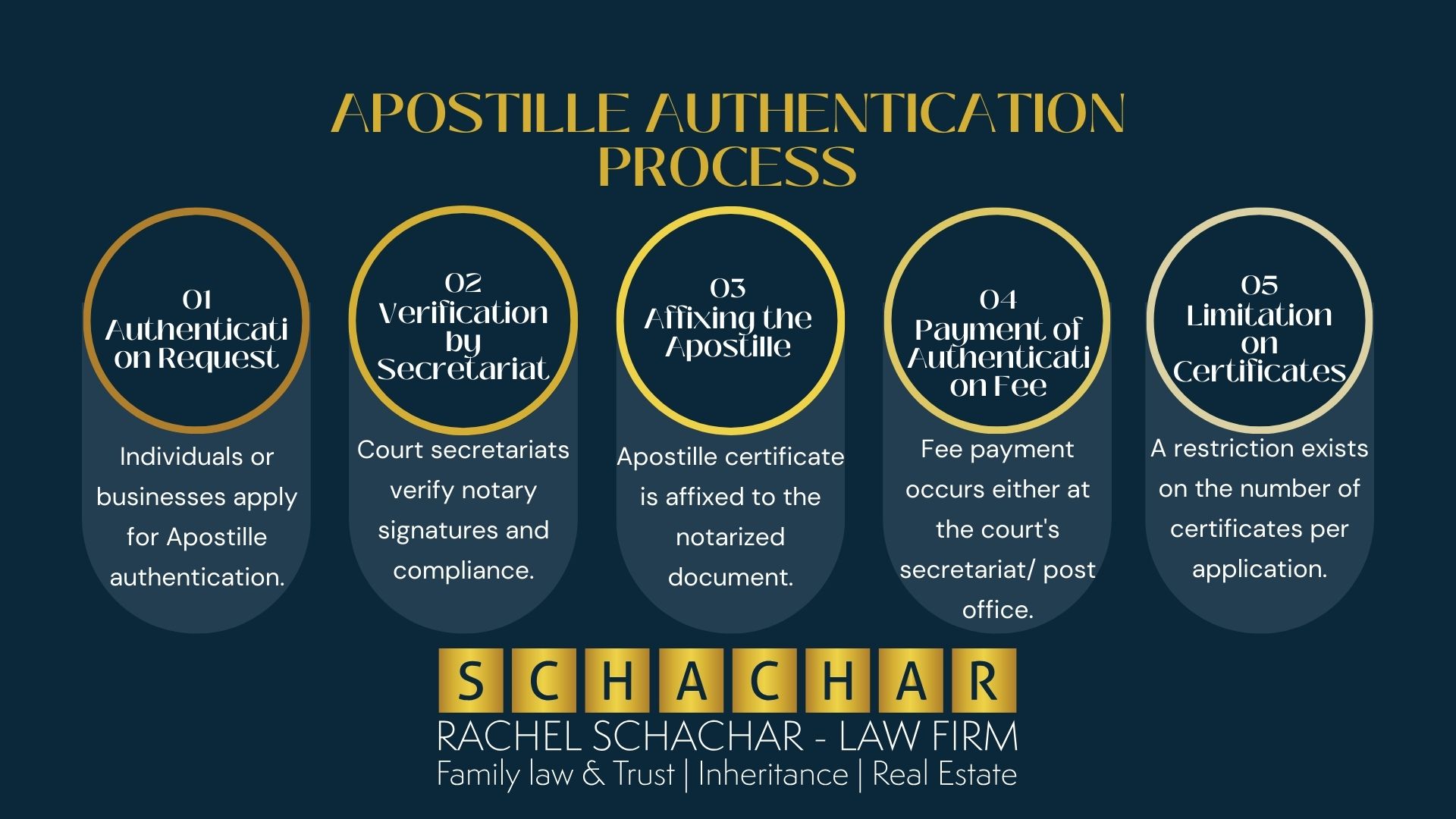Apostille in Israel: A Crucial Step in Document Authentication
In the realm of international document authentication, the term “Apostille” holds significant weight, particularly in Israel. It is a crucial process that ensures the validity of public documents issued within the country when they are intended for use abroad. In this article, we’ll delve into what an Apostille is and why it plays such a pivotal role in the realm of legal document authentication in Israel.
The Significance of Apostille
Before diving into the specifics of Apostille in Israel, it’s essential to grasp the broader concept. An Apostille is essentially a certificate issued by a competent authority that authenticates the legitimacy of a public document. These public documents can range from marriage certificates issued by the Ministry of the Interior to education certificates from the Ministry of Education and various other documents issued by state authorities.
Recognition Beyond Borders
The primary reason for Apostille authentication is to enable the recognition of these public documents in countries other than the one in which they were issued. Essentially, it serves as an internationally accepted seal of approval, facilitating the document’s legal validity abroad. This authentication process falls under the jurisdiction of the Ministry of Foreign Affairs in Israel.
Types of Apostille Certificates
| Type of Apostille Certificate | Purpose |
| “Apostille” Certificate | Intended for member states of the Hague Convention; verifies documents for countries within the convention. |
| “A Certificate Not in Accordance with the Convention” | Issued for countries not part of the Hague |
Types of Apostille Certificates
In Israel, there are two main types of Apostille certificates:
- The “Apostille” Certificate: This certificate is intended for countries that are members of the Hague Convention of 5 October 1961, which abolished the requirement of further legalization for foreign public documents. Israel is a member of this convention, which means that documents intended for member countries are verified with an “Apostille” certificate. This certificate adheres to a standardized format as stipulated in the convention.
- “A Certificate Not in Accordance with the Convention”: This type of certificate is issued by virtue of the Notaries Law of 5736 – 1976. It verifies the signature of a notary on a notarized certificate attached to public documents intended for countries that are not part of the Hague Convention.

The Role of the Secretariat of the Court
The verification process involves the secretariat of the court, ensuring that the certificate aligns with the laws and agreements established between Israel and the destination country. The Apostille certificate is affixed to the notarized document, and there is a fee associated with this service, which can be paid either at the court’s secretariat or at a post office.
Understanding the Service in the Courts
Across the country, employees in court secretariats have been authorized by the Minister of Justice to verify notary signatures. This service is available during the regular reception hours of the courts, from Sunday to Thursday between 08:30 to 13:30. It’s important to note that there’s a limitation on the number of authentication certificates an applicant can receive in a single application, typically up to 10 certificates.
Benefits of Apostille in a Globalized World
| Key Advantages | Description |
| Facilitating International Transactions | Apostille simplifies international transactions, making it easier to present academic credentials, engage in international contracts, and manage immigration and citizenship matters. |
| Mutual Trust Among Member Countries | The Hague Convention fosters mutual trust among member countries, enhancing recognition and acceptance of Apostille as a means of document verification. |
| Meeting the Demand for Authentication | The globalization process has led to an increased demand for Apostille services to authenticate official documents for international use. |
| Making Cross-Border Engagements Easier | Apostille’s global acceptance has made cross-border transactions and engagements more ac |
The International Relevance of Apostille
The Apostille process isn’t unique to Israel; it’s an international standard designed to simplify cross-border document authentication. The Apostille Convention has greatly streamlined the process, making it easier for individuals and organizations to navigate the complex landscape of international document recognition.
In conclusion, Apostille in Israel serves as a bridge between domestic documents and their acceptance on the international stage. It ensures that public documents issued within the country carry the necessary authentication to be recognized and accepted in foreign countries. Understanding the importance and process of Apostille is vital for anyone dealing with legal documents on an international scale.

Ensuring Documents for International Use
The Apostille process is especially critical for individuals and businesses engaged in international transactions or dealings. Whether it’s presenting academic credentials to foreign universities, entering into international contracts, or managing immigration and citizenship-related matters, Apostille authentication simplifies these processes. Without this authentication, documents may face rejection or require additional cumbersome procedures in foreign jurisdictions.
| Aspect | Description |
| What Is an Apostille? | An Apostille is a certificate of authentication issued by a competent authority that verifies the legitimacy of public documents. These documents include those issued by state authorities, such as marriage certificates and education certificates. |
| Purpose of Apostille | Apostille authentication is essential for ensuring the recognition and validity of public documents in foreign countries, allowing them to be legally accepted and utilized outside their country of origin. |
| Types of Apostille Certificates | In Israel, there are two primary types of Apostille certificates: 1. “Apostille” Certificate: For member states of the Hague Convention, adhering to a standardized format. 2. “A Certificate Not in Accordance with the Convention”: For non-member countries, verifying the signature of a notary. |
| Verification Process | The Apostille verification process in Israel involves: 1. Authentication request by applicants. 2. Verification by court secretariats to ensure compliance. 3. Affixing the Apostille certificate to the notarized document. 4. Payment of the authentication fee. 5. Limitation on the number of certificates per application. |
| Role of the Secretariat of the Court | Employees in court secretariats across Israel are authorized to verify notary signatures, facilitating the Apostille authentication process during regular court reception hours. |
| The Hague Convention and Apostille | Israel’s alignment with The Hague Convention streamlines the Apostille process for documents intended for member states, promoting mutual trust among countries and making Apostille a universally accepted means of document verification. |
| Benefits in a Globalized World | Apostille simplifies international transactions, aids in cross-border engagements, and meets the growing demand for document authentication in our increasingly globalized world. |
The Hague Convention: Simplifying Global Authentication
One of the significant advantages of Apostille in Israel is its alignment with The Hague Convention of 1961. Being a member of this convention significantly streamlines the authentication process for documents intended for other member states. This international agreement has fostered mutual trust among member countries, recognizing Apostille as an exclusive and sufficient means of verifying documents issued in one member state and intended for use in another. As such, the Apostille certificate serves as a universally accepted mark of authenticity, sparing individuals and organizations from the complexities of traditional embassy or consulate legalization.
The Evolving Landscape of Document Authentication
In our increasingly globalized world, the demand for Apostille services is on the rise. As the globalization process advances, the volume of official documents requiring authentication for international use has grown substantially. To meet this demand, many countries, including Israel, have embraced the Apostille Convention. This global acceptance of Apostille has not only simplified international document authentication but has also made cross-border transactions and engagements more accessible for people and businesses around the world. As the world continues to evolve, Apostille remains a cornerstone in ensuring the seamless flow of information and documentation across borders.
Our office specializes and is a leading office in Apostille services
If you find yourself in need of professional assistance with apostilles of any kind in Israel, look no further. Our firm; Rachel Schachar’s Law & Notary Firm’s, we specialize in navigating the intricate landscape of document authentication and apostille processes. Our team of experienced notaries and legal experts is dedicated to ensuring your documents are handled with the utmost care and expertise. Whether you’re dealing with apostilles, authentications, or any other aspect of international document validation, we are here to provide you with the guidance and support you need. Don’t let the complexities of document legalization deter you from your international ventures. Contact us today to discover how our services can streamline the process and help you achieve your global goals with confidence.


Lawyer and notary Rachel Shachar
A family attorney for inheritance, wills and divorce matters, she heads the Shahar attorney office, which is considered one of the boutique offices at the top of the law offices in Israel. The firm she founded grew and developed and today provides a variety of services, including


